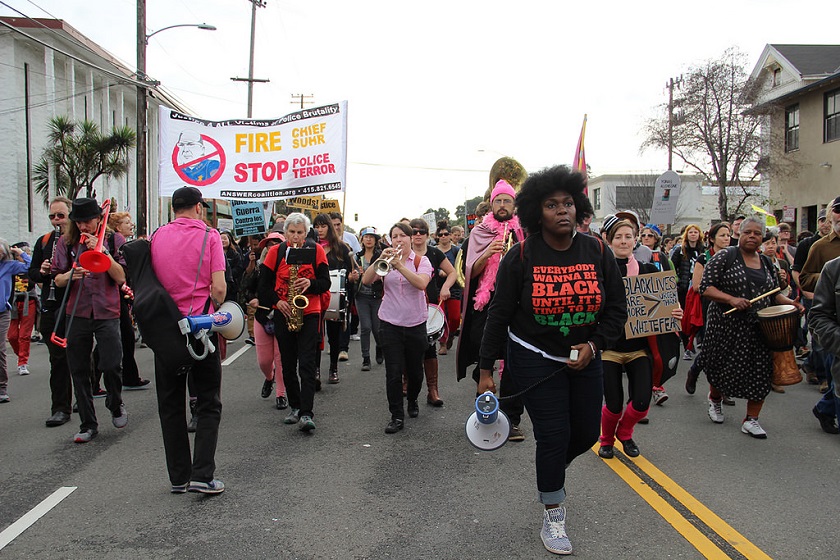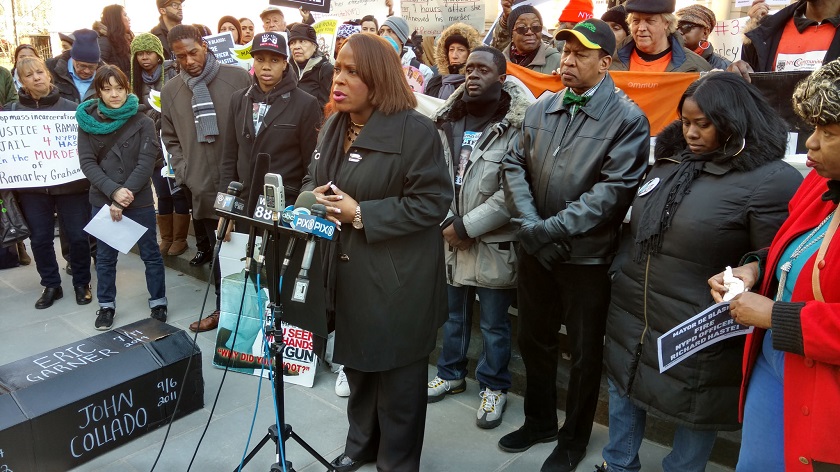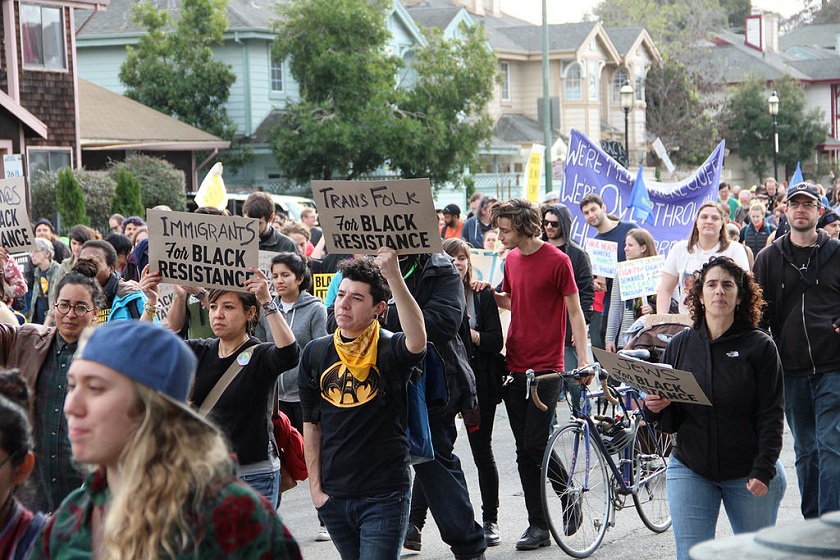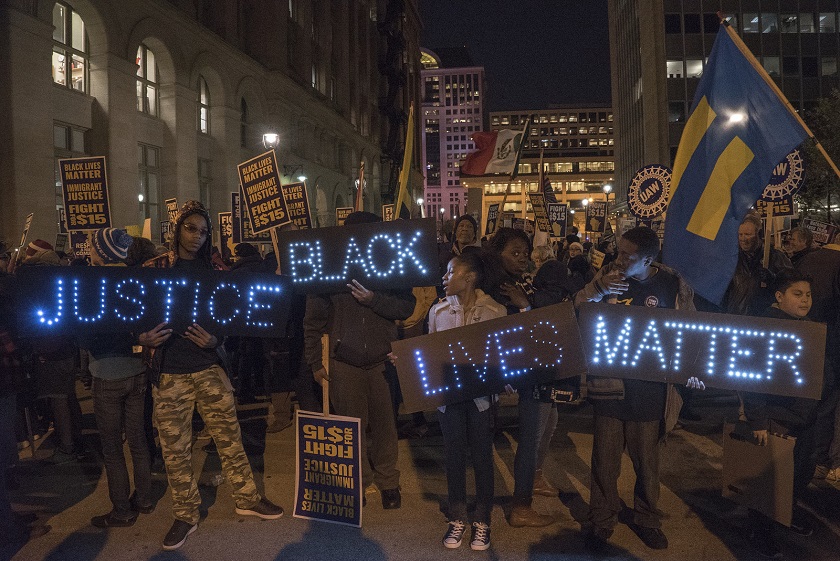Sarah Willie-LeBreton is a Black Quaker who teaches Sociology at Swarthmore College. This piece connects past and present, self and community, and Spirit and action in an exploration of Black Lives Matter. This is the first installment of a series in honor of Black History Month featuring the writings of contemporary Black Quakers on the subject of Black Lives Matter.
Religious practice can be the intersection between our best collective selves and an attempt to come to terms with the deepest moments we experience as humans. Quakerism has offered me the life-changing idea of continuing revelation and the regenerative practice of communal silence waiting upon Spirit.
Out of a kind of societal silence, the #BlackLivesMatter campaign has emerged. Like other social movements, it is of our time and unlike other movements that have preceded it. Its co-founders have observed that an ideology of white supremacy drives much state-sponsored violence and they have suggested that to undermine the ideology and stem the violence, the movement must remain both decentralized, non-violent, insistent and organized.
They have refused to deny the complexity of African Americans—naming and celebrating our multiple and sometimes overlapping identities as Christians, Muslims, Jews, Buddhists, atheists and agnostics.
 We are cisgender, queer and trans, poor, middle class, and affluent; we are teachers, physicians, carpenters, artists and actors, police officers and congressional representatives, pacifists, soldiers, engineers, veterans, dentists, scholars, architects, librarians, janitors, and people seeking work; we are plumbers and lawyers; carnivores and vegetarians; we speak many languages; we have ancestors who were indigenous to the Americas, traveled on the Mayflower, and were brought here in chains; we are many colors.
We are cisgender, queer and trans, poor, middle class, and affluent; we are teachers, physicians, carpenters, artists and actors, police officers and congressional representatives, pacifists, soldiers, engineers, veterans, dentists, scholars, architects, librarians, janitors, and people seeking work; we are plumbers and lawyers; carnivores and vegetarians; we speak many languages; we have ancestors who were indigenous to the Americas, traveled on the Mayflower, and were brought here in chains; we are many colors.
We are children and seniors, parents and childfree, single and partnered, and every one of us is precious.
It’s terribly important to acknowledge that the accomplishments of past social movements make it more difficult these days to degrade some people of color, some children, some women, some people with disabilities, some people who speak languages other than English, and some refugees.
And yet it’s equally important to acknowledge that powerful forces with sophisticated engines of propaganda are always at work describing exclusion as fair, treating meanness as ordinary, defending revenge, and pushing a narcotics of denial that makes us numb to the suffering of others.
 Many contemporary social scientists appreciate that income inequality in this country grows both because a small group of people have found ways to concentrate power and wealth and because some aspects of our economic, legal and political systems are anti-democratic, bureaucratically self-replicating and ideologically self-justifying.
Many contemporary social scientists appreciate that income inequality in this country grows both because a small group of people have found ways to concentrate power and wealth and because some aspects of our economic, legal and political systems are anti-democratic, bureaucratically self-replicating and ideologically self-justifying.
Science fiction warns us to fear the return of apes, the invasion of aliens, and the take-over of artificial intelligence. But the future is here, and many institutions, despots and taken-for-granted customs are already doing our thinking for us. We are regularly encouraged to fear and denigrate the beauty of human variety and the rich range of human cultures.
This large and ongoing project of division forms the backdrop to my own urgent search both for the analytical tools to understand human society and for community.
My own search is regularly undermined when I’m overcome with body-shaking anger over people recently killed or killers are legally exonerated; when tears of mourning well up without warning when I’m teaching a class, at a faculty meeting, or in line at the grocery store; when fear for my son’s life overwhelms me; when my impatience with the pace of change warps any tendencies I have toward kindness and generosity; when I want to walk away from Jesus’ teachings to turn the other cheek and love my enemies.
 In what I consider my good moments, I can appreciate that the advice to offer the other cheek when struck is an asymmetrical strategy of response, undermining the inevitability of continued violence.
In what I consider my good moments, I can appreciate that the advice to offer the other cheek when struck is an asymmetrical strategy of response, undermining the inevitability of continued violence.
In those good moments, I understand that loving my enemies is not mutually exclusive with either refusing to cooperate in my own oppression or being the ally of those resisting theirs. When I’ve had enough sleep or been surrounded by the wisdom of fellow travelers, I can hold both the nightmares and the work ahead. I sometimes feel as fragile as I feel grounded and clear at other times.
In my moments of despair, I don’t think about the nourishment that I receive along the way; I don’t remember the inspiration of those who struggled for justice before me; I’m blind to those who stand next to me now, and I lose faith that others will carry these struggles into the future.
In my moments of euphoria, I am just as likely to be entirely caught up in the present.
But in the quiet ritual of Meeting for Silent Worship I hear the call to my better self, I see the model of love in action; I’m engaged in uncomfortable conversations and challenged to discover relationships that I can sustain.
Like all social movements, the #BlackLivesMatter campaign is both of our time and unlike others that have preceded it. Like the insistent, urgent, demanding prophets of old, this movement calls each of us to live into the collective profession of our unusual faith without a creed. Out of the silvery silence: each one of us is precious.
Related Content